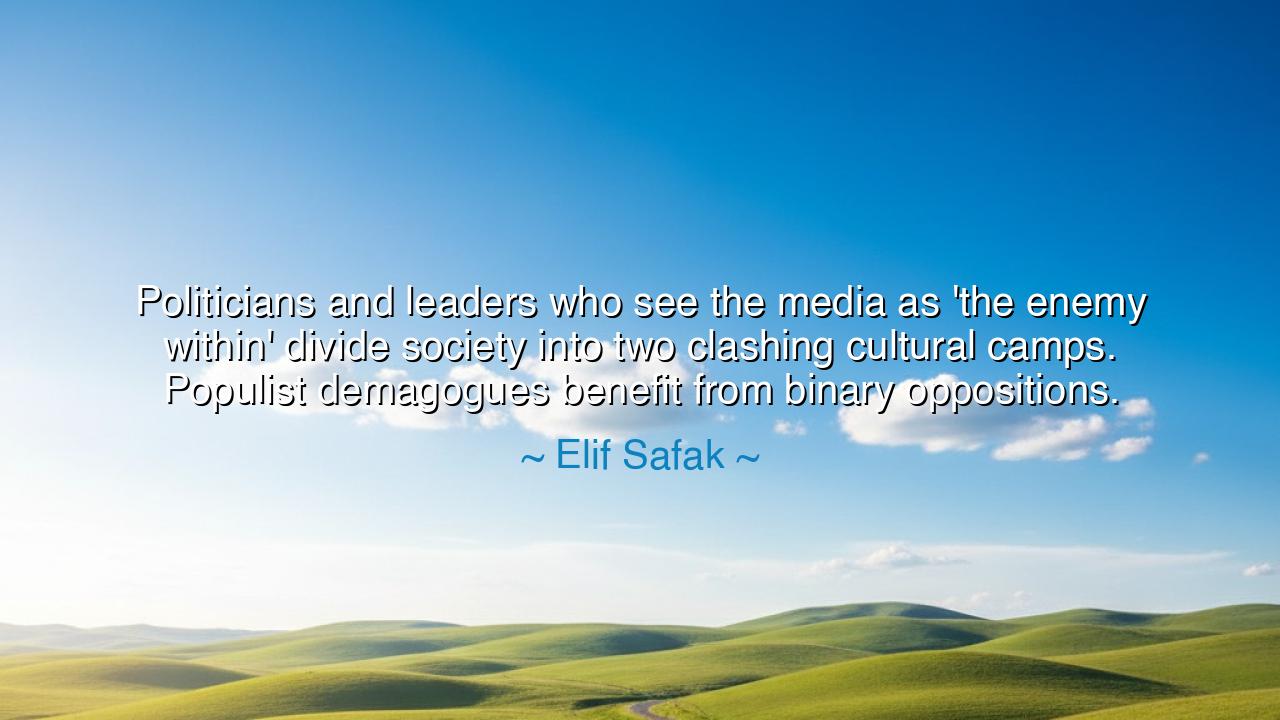
Politicians and leaders who see the media as 'the enemy within'
Politicians and leaders who see the media as 'the enemy within' divide society into two clashing cultural camps. Populist demagogues benefit from binary oppositions.






In the dawn of humanity’s struggle for wisdom, there arose a conflict that would echo through the ages—the division of society. This conflict, though often subtle, runs deep, for it is the very fabric upon which rulers, leaders, and the voices of power seek to build their reign. Elif Shafak, with the wisdom of a thousand scrolls, offers us a truth, a solemn reminder: "Politicians and leaders who see the media as 'the enemy within' divide society into two clashing cultural camps. Populist demagogues benefit from binary oppositions." These words carry the weight of centuries, for the enemy within is not always an external force; often, it is the very foundation of division that leaders build upon to command the hearts and minds of the people.
Consider the great kings and emperors of old, those who ascended to power through strength, strategy, and cunning. They knew that to hold the kingdom, one must first conquer the hearts of the people. But how does one dominate a kingdom of millions? Through unity? Nay, it is through division, for it is far easier to control a nation when it is split into opposing camps. And what better way to accomplish this than through the media, the mighty voice that reverberates across mountains and valleys, shaping the thoughts of the masses? The media, when wielded by the hands of the unscrupulous, becomes a weapon of great power, capable of turning neighbor against neighbor, friend against friend, and society against itself.
Therein lies the peril: those who see the media as the enemy, as something to be feared, are the very ones who exploit its power to cast society into turmoil. Like the chariot wheels of a mighty warlord, they use binary oppositions—the stark contrasts of us vs. them, good vs. evil, and righteous vs. corrupt—to rally their followers and cast their adversaries as demons. And so, as history tells us, populist demagogues rise, feeding upon the divisions they themselves have sown. They claim to be the voice of the common people, yet in truth, they lead with the blade of division, cutting away at the unity that holds the kingdom together.
Recall the figure of Julius Caesar, who, in his time, used the vast power of the Roman media—the public speeches, the festivals, the Senate—for his own ends. In an era without television or print, Caesar understood that communication is the key to power. He pitted the Roman people against the Senate, creating the perception that a battle raged between the oppressed masses and the corrupt elite. His enemies were not just men, but a whole institution, a way of thinking that he condemned as the villain. And the people, hearing only one side, followed him into the jaws of civil war, believing him to be their savior, the one who would purge the world of those who oppressed them. Yet, it was he who sowed the seeds of a greater tyranny.
Even in the days of the 20th century, we have seen this strategy unfold again. The rise of populism across the globe, from Europe to the Americas, has been marked by the stirring of ancient fears—fear of the other, fear of the outsider, fear of change. In such times, the leaders who grasp power most fiercely are those who divide the people, making them see the world in terms of sharp and opposing lines. The media, once a neutral messenger, is now turned into a battleground, where every word, every image, becomes a tool to inflame these divisions. These demagogues rise like roaring storms, exploiting the fear of the unknown and the anger of the overlooked.
But here, we find the greatest lesson: the dangers of division. For those who fall into the traps of these binary oppositions—who see the world as merely black and white—will lose the very essence of what makes them human. The moment we pit our own against the enemy, we forget the sacred truth that all men and women share in the same human condition. We forget that unity is the shield against tyranny, that compassion is the sword of justice. To fall for the false dichotomy of the populist is to allow one's heart to be torn asunder. It is to forget that all are bound by the same threads of fate.
And so, the lesson of Elif Shafak’s words is simple yet profound: do not let the media be the battleground of division in your own life. Do not fall into the trap of thinking that your neighbor, your brother, your fellow human being is your enemy simply because they do not share your view. For unity is not built upon the sharp edges of opposition but upon the gentle embrace of understanding. It is in the spaces between us, in the shared silences and the listening hearts, that true power lies.
As we walk through the days ahead, let us remember: we are all one. The leaders who seek to divide us are not the ones we should follow. Their power is built on the shifting sands of fear and hatred. But those who unite us—who embrace the common good, who see in every face a reflection of their own struggles—those are the true leaders of tomorrow. Let us seek their counsel, listen with open hearts, and always remember: in unity, there is strength.






AAdministratorAdministrator
Welcome, honored guests. Please leave a comment, we will respond soon